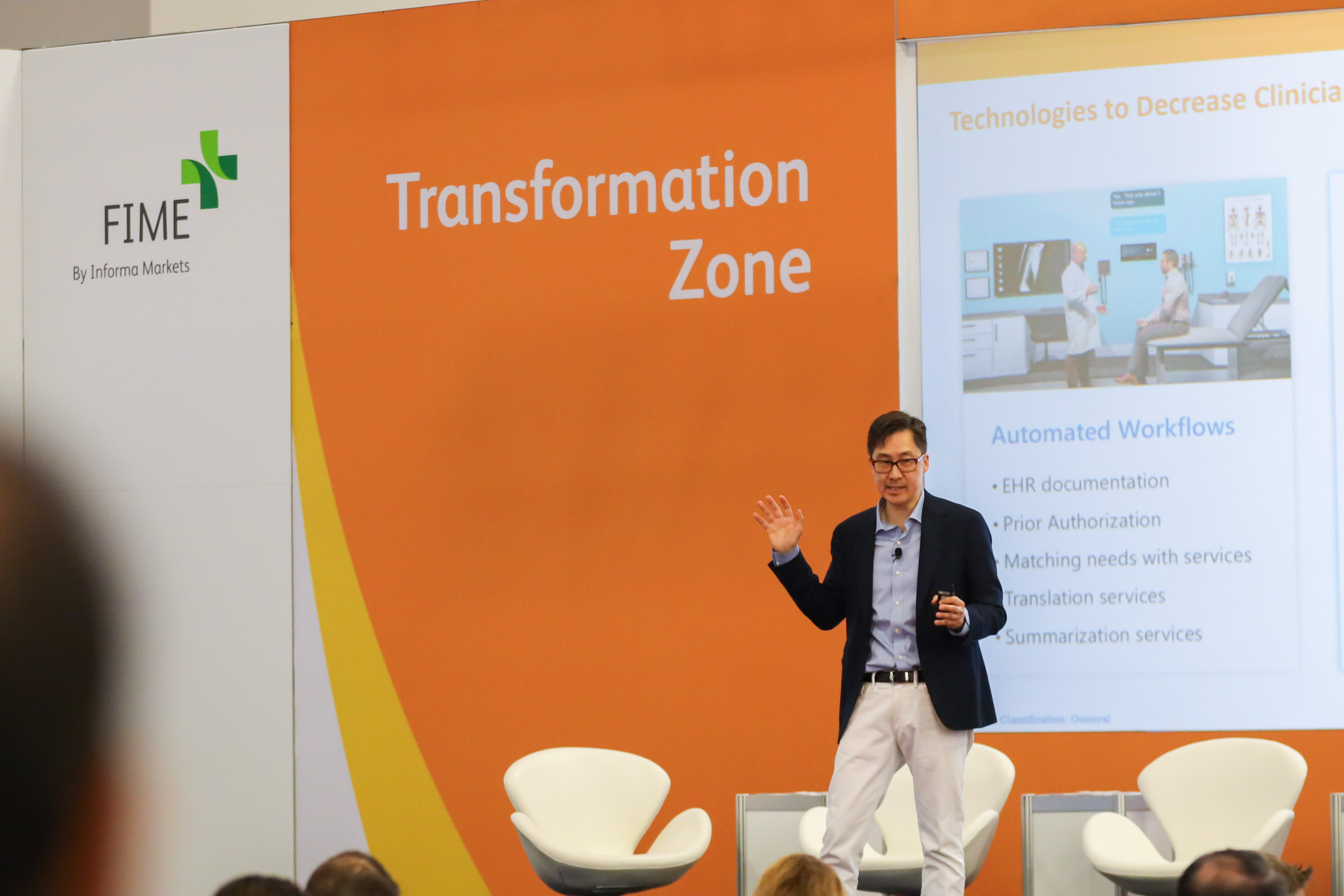The Transformation Zone at FIME 2023 is one of the most anticipated features of the show, with the Transformation Talks serving as a powerhouse of innovation and future insights. This dynamic space brought together thought leaders, innovators, industry experts, and tech giants from the US and Latin America. High-profile speakers discussed topics such as AI in healthcare, advances in telemedicine, digital health transformation, and more.
On day one of the Transformation Talks, Dr. Garth Graham, Director and Global Head of Healthcare and Public Health, Google / YouTube, Miami, Florida, US, spoke to a packed audience of healthcare professionals on the importance of information dissemination to improve health outcomes.
When it comes to healthcare and public health today, the days of billboards, phone calls and flyers are gone. Today, there are multiple modalities from which people get their information, such as video or WhatsApp. Accessing healthcare information online or “Googling” symptoms is already a major part of the global patient experience. But verifiable information is often behind paywalls, which restricts access. This acts as a barrier to receiving health information that could ultimately lead an individual down the wrong path. The question then is, how do we navigate and change these patterns in the future?
Related: Health tech innovation in the spotlight as FIME 2023 opens doors
Dr. Graham highlighted: “Information is a determinant of health, and so we have to think about the information that's credible, obtainable, authentic, relatable, and actionable. Today, there is almost too much information that's accessible. How we deliver information to communities at scale is one of the primary factors that determine the health of the community. If you think about the typical patient journey, you tend to think mainly about service delivery. But how can you empower the patient with the information? As we saw during the pandemic, the whole world was also battling an infodemic, with a lot of fake news doing the rounds. So, learning from that experience, thinking about the context and quality of information and information connectivity, and how to effectively engage people, is essential.”
He stressed that whether it is talking to communities in Indonesia, Paris, England, Brazil, or the Bronx, healthcare systems need to ensure that people have access to information from scientific sources that answers all their questions clearly and in a relatable and engaging manner.
“A lot of information today is user-generated, and for individuals who work in healthcare, that makes many of us uncomfortable,” said Dr. Graham. “Because the kinds of people generating this health information are not always those from scientific or authoritative sources. Some of this content also comes from people who are part of patient journeys and sharing their personal experiences. The advent of AI now allows the opportunity for challenging inaccurate health information, which can be corrected and spread to communities that scale.”
He concluded: “Doctors don't own all the health information. The healthcare system doesn't own all health information. Therefore, the question is, how do we create and engage in that overall spectrum and recognise the role of the individual and community and recognise the role of healthcare delivery systems to help deliver that information? More importantly, we need to focus on delivering continuing and engaging information. The goal is to work towards a healthcare delivery system that recognises the impact of disseminating accurate information and helps deliver that information at scale.”
AI to the rescue
Earlier in the day, Dr. David Rhew, Global Chief Medical Officer & VP of Healthcare, Microsoft, New York, US, kickstarted the Transformation Talks session by spotlighting artificial intelligence (AI) and its role in enhancing patient outcomes.

Dr. David Rhew
He shared that while AI has become prevalent across several industries, its impact on healthcare will go a long way in improving patient experience, health outcomes, and access and quality of care.
Dr. Rhew explained: “AI, machine learning or deep learning have the ability to understand and anticipate the next word and the next concept. By anticipating what comes next, we can actually do things that we could never envision before.”
Related: Omnia Health Magazine May - June 2023
The industry is currently facing several challenges, such as increasing staff burnout, health costs, and lack of care for underrepresented and vulnerable populations. By leveraging AI, organisations can help tackle some of these challenges.
Dr. Rhew highlighted AI could be used to ease some of the administrative burdens of the healthcare staff. For example, doctors spend around six to eight hours documenting notes. Using AI tools can cut this time in half, allowing the clinician to express empathy and connect with patients as human beings. These notes can also be edited easily and input directly into electronic health records. AI is also helping the industry move its focus from a reactive model to a more proactive one by helping predict a bad outcome before it happens and intervene as necessary.
Visit the Florida International Medical Expo (FIME) in Miami to learn more.


